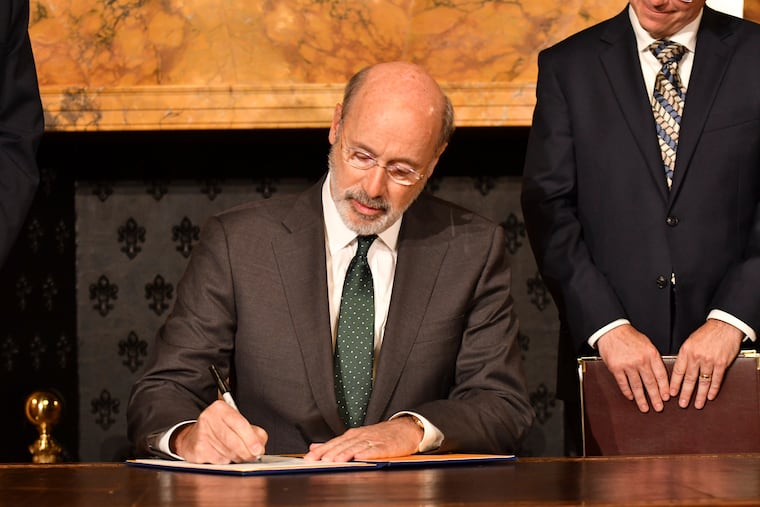A climate fight in Harrisburg shows how Gov. Wolf wants to use his power
Since taking office, Wolf has tried to impose his vision instead of working for compromise with the legislature. That’s not how government works.

In school, American children are taught that our government has three branches: the executive, the legislative, and the judicial. Each does its own job and jealously guards its power, with the effect that the power of government is divided and the people’s liberty ensured. That was how James Madison and the Founding Fathers drew it up, anyway.
Maybe Gov. Tom Wolf could use a refresher course on the concept.
While the crisis of COVID-19 loomed, people trusted in strongmen who proclaimed that they alone would lead us out of it. Federal bureaucracies exercised their limited powers, but the real action was in the states. Governors (including our own) ignored legislatures, said they were too slow to deal with the rapidly emerging problem, and settled in to rule by executive order.
That made some sense in the very early days — that is why legislatures have, in the past, chosen to invest governors with emergency powers. But after more than a year of rule by emergency decree, the Pennsylvania legislature and the voters had enough. They approved constitutional amendments limiting the governor’s power in an emergency and restored a sense of normal government to the commonwealth.
I wasn’t surprised to see that they were fed up. Because even before the pandemic, Wolf had a predilection for ignoring a legislature controlled by the opposite party. Since taking office, Wolf has often resorted to executive orders to impose his vision instead of working for compromise with the legislature.
“Even before the pandemic, Wolf had a predilection for ignoring a legislature controlled by the opposite party.”
The emergency conditions of the early pandemic only accelerated the trend at all levels of government of short-circuiting the separation of powers. But the mere proclamation of an emergency condition — be it COVID or global warming or anything else — does not necessarily mean that executives no longer must abide by the constitution they swore to uphold.
In 2019, Wolf’s administration claimed it wanted to work with the legislature to have Pennsylvania join the Regional Greenhouse Gas Initiative (RGGI), a regional cap-and-trade network of Northeastern states that seeks to reduce carbon emissions. RGGI works by setting a regional limit on carbon emissions, and lets companies within that region divvy up that total by bidding for individual allowances.
The effort at normal governance did not last long; two weeks after saying he wanted to work with the state legislature, Wolf signed an executive order directing the state’s Department of Environmental Protection to draw up the necessary regulations to join it, with or without the legislature. The department finalized those rules in July. Attorney General Josh Shapiro’s office pronounced the effort legal a few months later.
Most of the discussion at the time focused on whether joining RGGI was a good idea, whether it would reduce global warming, and whether it would cost Pennsylvanians jobs. Lost in all of that, for the most part, was a serious discussion of what a governor’s job is, and whether Wolf had the authority to exercise the powers he claimed for himself.
» READ MORE: Should Pa. join the Regional Greenhouse Gas Initiative to fight climate change? | Pro/Con
This is not how government is supposed to work. The General Assembly passed a bill disallowing the regulations, which it said amount to a tax. It’s a fair point — a Penn State report estimates that RGGI may cause consumers to pay an extra $2 billion over the next nine years, and states have “discretion” over how best to use their proceeds from RGGI. That sounds like a tax to me: RGGI makes people pay more for energy and delivers that excess payment to the government.
Wolf vetoed the attempt to rein in his power. Both of the major party candidates for governor in 2022 have said RGGI membership may not be a good fit for Pennsylvania (even though Shapiro’s office maintains that Wolf’s actions are legal). Yet Wolf perseveres in claiming he has the power to make RGGI happen with the stroke of his pen.
There are serious questions about whether RGGI is a good fit for a state that produces significantly more electricity than other RGGI member states. Even if you share Wolf’s vision of reducing carbon emissions, consider, as State Sen. Gene Yaw noted earlier this year, that emissions in our state have decreased by 38% since 2006 without RGGI, more than all the RGGI states combined.
These are the sorts of questions that can be answered when governments pass laws through their legislatures. The hearings and testimony by experts allow for the airing of facts and opinions that can lead to better decisions, arrived at openly. This is unsurprising, given that the legislatures are the branch of government designed to make laws. Putting that power in the hands of one person short-circuits the process.
One-man rule is more efficient, perhaps, but it does not represent the will of the people, nor is it more likely to arrive at the correct solution.
It’s a question of priorities, balancing the desire for good jobs with the desire for a better environment. But in Wolf’s style of government, the only priorities considered are his, and the only balance considered is how much he can get away with before the courts — or the people — have had enough.
Kyle Sammin is editor-at-large at Broad + Liberty.